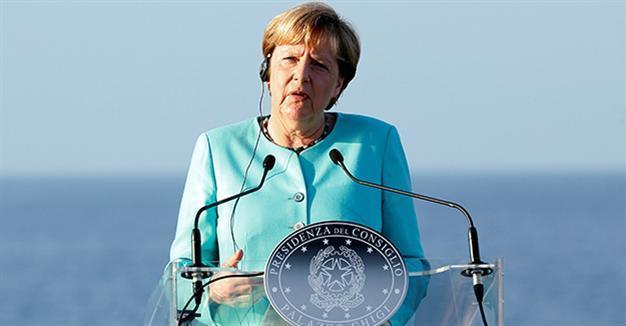‘Can’t beat migrant smugglers without Turkey,’ says Merkel
ROME

REUTERS photo
German Chancellor Angela Merkel has said that cooperation with Turkey within the scope of the European Union’s migrant deal was right and without that deal the bloc would not be able to fight human smugglers.“The coast guard alone cannot control maritime borders; we have to still do more. The cooperation with Turkey on migrants is right, otherwise we cannot win the fight against smugglers,” Merkel was quoted as saying by Italy’s ANSA news agency on an Italian aircraft carrier hosting an Italian-German-French summit off the island of Ventotene on Aug. 21.
Merkel added that “Germany has changed it stance” on the migrant issue. “For many years we were against the Europeanization of this issue, now we want more European cooperation,” she said.
Turkey and the EU agreed in mid-March on a deal in which Turkey would help curb the migrant flow into the bloc in exchange for visa-free travel for Turkish citizens inside the EU’s Schengen zone, accelerated membership talks and a total of 6 million euros to be used on Syrian refugees in Turkey.
The EU was paralyzed in 2015 when over 1 million refugees, mostly via Turkey, entered the bloc in hopes of a better life fleeing war, poverty and devastation.
Relations between Turkey and the EU became strained after the EU insisted Turkey needed to meet all of the 72 criteria in the deal, including amendments to its anti-terror law, in order to get its citizens visa-free travel inside the bloc.
Relations worsened after the July 15 failed coup attempt in Turkey, after which Turkey accused the EU of not standing strongly enough next to it but rather more closely considering the crackdown that came in the aftermath of the failed attempt.
Talks over post-Brexit EU
Merkel, French President Francoise Hollande and Italian Prime Minister Matteo Renzi met Aug. 22 in Italy’s Ventotene for a second mini-summit of the EU’s three largest countries by population, organized with the intention of plotting a new course for the union following the U.K. referendum.
The three leaders insisted that Britain’s vote to leave the European Union, also known as Brexit, did not spell the beginning of the end for the bloc, pledging to revive it by bolstering EU security, boosting economic growth and giving the continent’s youth a future.
“Many thought the EU was finished after Brexit but that is not the case,” said Renzi on the Garibaldi aircraft carrier off Ventotene.
“We respect the choice made by the citizens of Britain but we want to write a future chapter. Europe after Brexit will relaunch the powerful ideals of unity and peace, freedom and dreams.”
In a meeting heavy on symbolism, the three leaders visited Ventotene to lay a wreath on the tomb of Altiero Spinelli, an Italian intellectual seen as a founding father of European unity.
The meeting was designed to lay the groundwork for an EU summit in Bratislava next month.
“We won’t make decisions on behalf of other member nations but we will commit ourselves to lead,” Hollande said, adding that one of the most urgent tasks was to end economic and political uncertainty following the Brexit vote.
Hollande also stressed the need for improved security and intelligence-sharing to bolster Europe’s defenses against a wave of Islamic extremist violence.
At their first round of talks in June, the leaders had called for “a new impulse” for the EU.
















